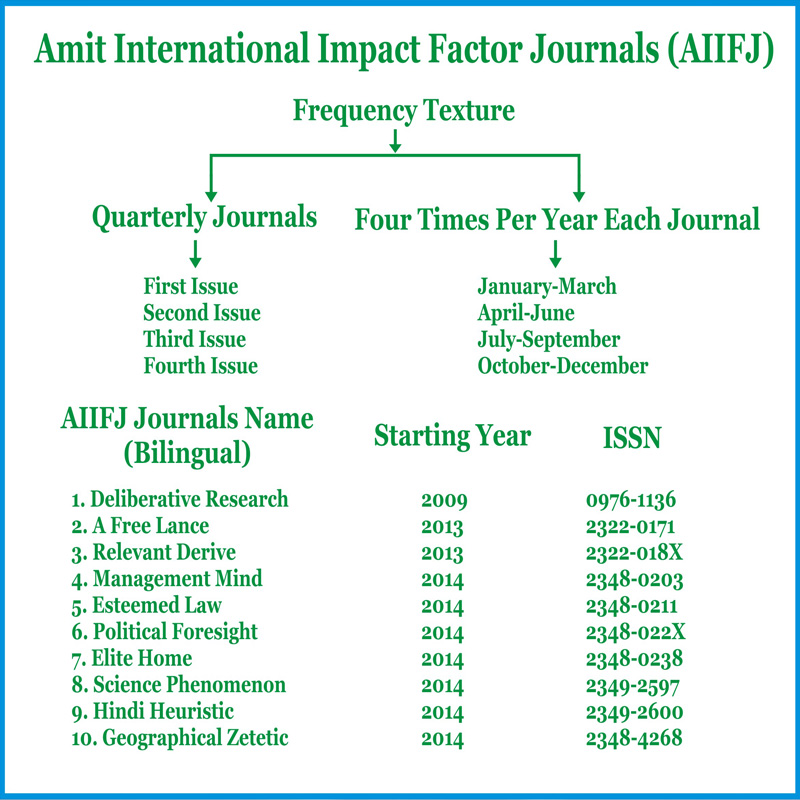
AIIFJ Ethics Policy
Preamble
Research is a common enterprise, carried out in academic, industry and other settings. It involves collaboration, direct or indirect, which often transcends social, political and cultural boundaries. It is underpinned by freedom to define research questions and develop theories, gather empirical evidence and employ appropriate methods. Therefore, research draws on the work of the community of researchers and ideally develops independently of pressure from commissioning parties and from ideological, economic or political interests.
Principles
- Responsibility
- Accountability
- Reliability
- Honesty
- Respect
Good Research Practices
Research Environment • Training, Supervision and Mentoring • Research Procedures • Safeguards • Data Practices and Management • Collaborative Working • Publication and Dissemination • Reviewing, Evaluating and Editing.
The publication of a research paper in a peer-reviewed journal is an essential building block in the development of a coherent and respected network of knowledge. It is a direct reflection of the quality of the work of the authors and the institutions that support them. Peer-reviewed articles support and embody the scientific method. It is therefore important to agree upon standards of expected ethical behavior for all parties involved in the act of publishing: the author, the journal editor, the peer reviewer, the publisher and the society of society-owned or sponsored journals.
Authorship : Authorship should be limited to those who have made a significant contribution to the conception, design, execution, or interpretation of the reported study.
Originality and plagiarism: The authors should ensure that they have written entirely original works, and if the authors have used the work and/or words of others, that this has been appropriately cited or quoted.
Data access and retention: Authors may be asked to provide the raw data in connection with a paper for editorial review, and should be prepared to provide public access to such data.
Multiple, redundant or concurrent publication: An author should not in general publish manuscripts describing essentially the same research in more than one journal or primary publication. Research Department, Auricle Technologies Pvt. Ltd. does not view the following uses of a work as prior publication: publication in the form of an abstract; publication as an academic thesis; publication as an electronic preprint. Information on prior publication is included within each Research Department, Auricle Technologies journal’s Guide for Authors.
Acknowledgement of sources: Proper acknowledgment.
Disclosure and conflicts of interest: All submissions must include disclosure of all relationships that could be viewed as presenting a potential conflict of interest.
Fundamental errors in published works: When an author discovers a significant error or inaccuracy in his/her own published work, it is the author’s obligation to promptly notify the journal editor or publisher and cooperate with the editor to retract or correct the paper.
Reporting standards: Authors of reports of original research should present an accurate account of the work performed as well as an objective discussion of its significance.
Hazards and human or animal subjects: Statements of compliance are required if the work involves chemicals, procedures or equipment that have any unusual hazards inherent in their use, or if it involves the use of animal or human subjects.
Use of patient images or case details: Studies on patients or volunteers require ethics committee approval and informed consent, which should be documented in the paper.
Editors Responsibility
- Acceptance/Rejection/Acceptance with modification decision
- Fair play in review
- Confidentiality
- Disclosure and Conflicts of interest
- Involvement and cooperation in investigations
Reviewers Responsibility
- Contribution to Editorial Decision
- Promptness
- Confidentiality
- Standards of Objectivity
- Acknowledgement of Source
- Disclosure and Conflicts of Interest
Authors Responsibility
- Reporting standards
- Data Access and Retention
- Originality and Plagiarism
- Multiple, Redundant or Concurrent Publication
- Acknowledgement of Sources
- Authorship of the Paper
- Hazards and Human or Animal Subjects
- Disclosure and Conflicts of Interest
- Fundamental errors in published works
Publisher Responsibility
We are committed to ensuring that advertising, reprint or other commercial revenue has no impact or influence on editorial decisions. In addition, AIIFJ will assist in communications with other journals and/or publishers where this is useful to editors. Finally, we are working closely with other publishers and industry associations to set standards for best practices on ethical matters, errors and retractions-and are prepared to provide specialized legal review and counsel if necessary.
Violations of Research Integrity
Fabrication – is making up results and recording them as if they were real.
Falsification – is manipulating research materials, equipment or processes or changing, omitting or suppressing data or results without justification.
Plagiarism Detection
The peer review process is at the heart of the success of scientific publishing. As part of our commitment to the protection and enhancement of the peer review process, AIIFJ has an obligation to assist the scientific community in all aspects of publishing ethics, especially in cases of (suspected) duplicate submission or plagiarism.

